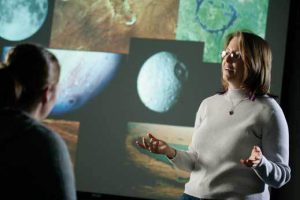One only has to look upward to see the direction that Dr. Jennifer Anderson’s career has taken. A lifelong learner, she knew from an early age that she wanted to “teach future teachers how to teach science better.”
As associate professor of Geoscience at Winona State University, Anderson does just that. Using tools like the campus observatory telescopes, she is educating students and the greater Winona community about planets, stars, and the solar system, which often evolves into larger discussions about where we came from and why we’re here.
Anderson built her first telescope when she was just 13 years old as part of an astronomy camp. “My parents were both teachers. As a kid, my natural curiosity about the night sky was always encouraged and supported,” says Anderson.
After receiving bachelor’s degrees in geophysics, astrophysics, and physics at the University of Minnesota, she received a doctorate in geological science at Brown University. Today, she specializes in planetary geophysics and has conducted significant experimental research on impact cratering with NASA.
When Anderson arrived at Winona State in 2005, she was delighted to find an observatory, although it was seldom used and needed repair. As part of the restoration process, she led an effort to upgrade its telescopes, including the installation of a 12-inch Meade reflecting telescope.
It wasn’t long before renewed interest in the observatory spread throughout the community, and students who shared Anderson’s passion for exploring the skies formed their own Astronomy Club. “The 12-inch Meade is computer controlled and easy to use. Students use coordinates to locate objects,” explains Anderson.
“There’s nothing like standing next to someone seeing Saturn for the first time through a telescope. They’re bowled over!”
In keeping with this year’s university theme, “Big Sky,” Anderson and the Astronomy Club presented lectures to the public, including a recent talk exploring the sky using astronomical tools such as solar scopes. Community participants enjoyed learning more about the sun, moon, and the planets, and were thrilled to learn that during warm weather months, the observatory is open to the public for viewing the night sky over Winona.
“People have a thirst for the night sky that cannot be quenched,” says Anderson. “Just like clean water and air, the sky is a natural resource. If you take a few minutes to view it and be amazed at its beauty, it puts you in context. It can calm you, make you happy, and help you return to childhood wonder!”
Visit Anderson’s website to learn more.


